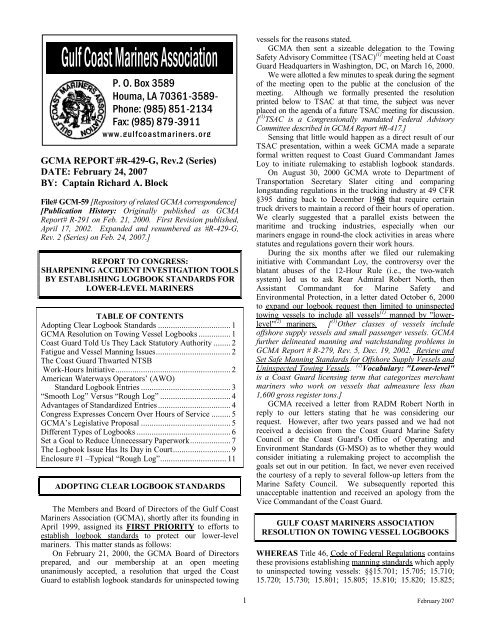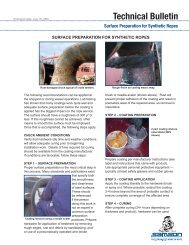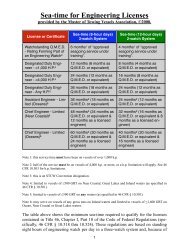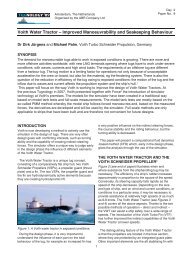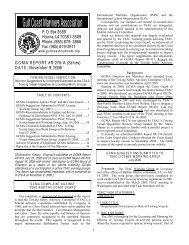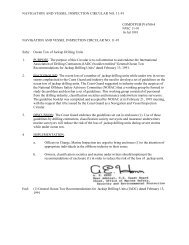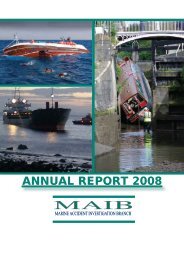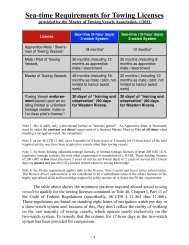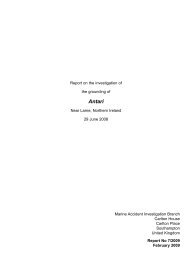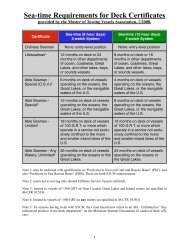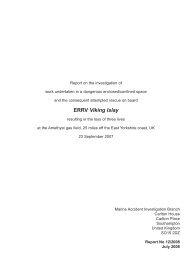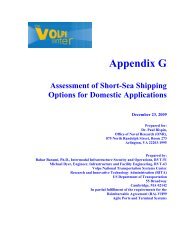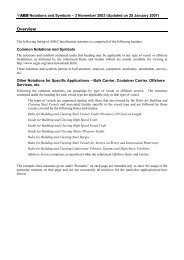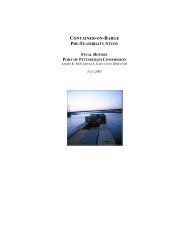R-429-G, Rev. 2 - Towmasters: the Master of Towing Vessels Assoc ...
R-429-G, Rev. 2 - Towmasters: the Master of Towing Vessels Assoc ...
R-429-G, Rev. 2 - Towmasters: the Master of Towing Vessels Assoc ...
You also want an ePaper? Increase the reach of your titles
YUMPU automatically turns print PDFs into web optimized ePapers that Google loves.
15.840; 15.850; 15.855; 15.905; 15.910; 15.915...WHEREAS <strong>the</strong>se manning standards include provisions thatlimit hours <strong>of</strong> operation by any licensed towing vessel <strong>of</strong>ficer oroperator to a maximum <strong>of</strong> 12 hours in any 24 hour period...WHEREAS 33 CFR §164.80 (inter alia) requires inspectionand testing <strong>of</strong> various items <strong>of</strong> towing vessel equipment andlogging <strong>the</strong> results as follows: "To ensure compliance with thisrule, <strong>the</strong> Coast Guard requires a record <strong>of</strong> tests even if nothingfails. In <strong>the</strong> interest <strong>of</strong> minimizing <strong>the</strong>se reports, <strong>the</strong> CoastGuard has not dictated <strong>the</strong> format <strong>of</strong> <strong>the</strong> entry and will continueto allow companies to use <strong>the</strong>ir established procedures." (1)WHEREAS 46 CFR §27.355 requires instructions, drills, andsafety orientations conducted on both new and existing towingvessel with <strong>the</strong> presumption that <strong>the</strong>se events will be logged...WHEREAS many <strong>of</strong> our members, as "employees at will,"report that <strong>the</strong>y have no choice but to disregard certainmanning regulations in order to hold <strong>the</strong>ir jobs...WHEREAS many <strong>of</strong> our members report operating in afatigued condition...WHEREAS Coast Guard boarding <strong>of</strong>ficers cannotadequately and fairly enforce statutory hours <strong>of</strong> work andrest and o<strong>the</strong>r manning regulations in 46 CFR Part 15without viewing adequate logbook entries...THEREFORE, BE IT RESOLVED THAT THE GULFCOAST MARINERS ASSOCIATION petition <strong>the</strong> CoastGuard to initiate rulemaking action (2) to require masters,mates, pilots, or operators <strong>of</strong> uninspected towing vessels toaccurately and fully log <strong>the</strong> working hours <strong>of</strong> all crewmembers at <strong>the</strong> end <strong>of</strong> each watch in a suitable vessellogbook containing consecutively numbered pages and thatsuch accumulated logbooks be kept onboard at all times t<strong>of</strong>ully disclose compliance with all applicable work hour andmanning regulations for <strong>the</strong> past 90 days.(1)Refer to CGD 94-020, 61 FR 35070, July 3, 1996. Somecompanies use a rubber stamp with or without a signatureto “certify” that all tests required by 33 CFR §164.80were performed without specifying ei<strong>the</strong>r <strong>the</strong> nature <strong>of</strong> <strong>the</strong>tests or <strong>the</strong>ir results.(2)Under <strong>the</strong> provisions <strong>of</strong> 33 CFR §1.05-20.THE COAST GUARD TOLD USTHEY “LACK STATUTORY AUTHORITY”In a letter dated December 2, 2002, Captain M.W.Brown, Chief, Operating and Environmental Standards (G-MSO) stated: Research conducted by <strong>the</strong> Coast GuardHeadquarters legal staff indicated that <strong>the</strong> Coast Guard lacks<strong>the</strong> requisite statutory authority to generate regulationsrequiring logbooks on vessels not already required to havelogbooks by 46 U.S. Code §11301(a). For vessels requiredto have logbooks, <strong>the</strong> additional entry requirementsrequested by GCMAs petition are outside <strong>the</strong> scope <strong>of</strong> 46U.S. Code §11301(b). Based on this and <strong>the</strong> general lack <strong>of</strong>statutory authority, <strong>the</strong> Coast Guard will not initiate arulemaking project.Legislative Change Proposal?We <strong>the</strong>n pursued a new route and asked <strong>the</strong> Coast Guardto initiate a Legislative Change Proposal (LCP) to askCongress for <strong>the</strong> requisite statutory authority. Thisconsumed more time yet garnered no results althoughGCMA determined <strong>the</strong> procedure to follow to make a LCPand determine that such a path would lead to ano<strong>the</strong>r deadend within Coast Guard Headquarters. Consequently, inlight <strong>of</strong> <strong>the</strong> Coast Guard's apparent lack <strong>of</strong> interest inimproving one <strong>of</strong> <strong>the</strong>ir key investigative tools to render itmore useful in accident investigation, we now seek directCongressional support to make a meaningful change to bothprotect our mariners and improve <strong>the</strong> quality <strong>of</strong>investigations to support existing and future regulations.We believe this is especially important in light <strong>of</strong> Section415 <strong>of</strong> <strong>the</strong> Coast Guard Authorization Act <strong>of</strong> 2004 thatamended 46 U.S. Code §3301(15) to inspect towing vessels.GCMA has actively participated in <strong>the</strong> ongoing rulemakingprocess. (1) [ (1) Refer to GCMA Report #R-276, <strong>Rev</strong>. 9, June1, 2005. <strong>Towing</strong> <strong>Vessels</strong> Must Be Regulated Like EveryO<strong>the</strong>r Inspected Vessel. And GCMA Report #R-276-A, Nov.9, 2006. <strong>Towing</strong> Vessel Inspection: Mariner Suggestions &Initiatives Submitted to <strong>the</strong> TSAC <strong>Towing</strong> Vessel Inspection& Licensing Work Groups.]FATIGUE AND VESSEL MANNING ISSUESOne <strong>of</strong> <strong>the</strong> principal concerns for our lower-levelmariners is that <strong>the</strong> absence <strong>of</strong> a statutory requirement forconsistent logbook standards facilitates <strong>the</strong> cover-up <strong>of</strong>mariner abuse. GCMA revealed <strong>the</strong> principal abuses in <strong>the</strong>following reports posted on our internet website:— GCMA Report #R-370. Jun. 16, 2003. 12 Hour RuleViolation: The Verret Case.— GCMA Report #R-370-A (Draft) Oct. 11, 2006. Reportto Congress: Violation <strong>of</strong> <strong>the</strong> 12-Hour Rules: WebbersFalls Accident <strong>Rev</strong>isited.— GCMA Report #R-370-B, <strong>Rev</strong>.4, Jun. 1, 2006. Violation<strong>of</strong> <strong>the</strong> 12-Hour Rules: The Tug Chinook Strikes &Damages The Lake Washington Bridge.— GCMA Report #R-370-C, <strong>Rev</strong>.2, Jun. 5, 2006. 12-HourRule Violations: The Winkler Case.— GCMA Report #R-370-D. Jun. 28, 2006. Work-HourAbuse, Whistleblower Protection and Deadhead Transportation.(13 pgs.)— GCMA Report #R-370-E, July 6, 2006. CrewEndurance: Work-Hour Laws and Regulations Need<strong>Rev</strong>iew.— R-370-F., July 6, 2006. Crew Endurance ManagementSystems.— R-370-G. Nov. 21, 2006. Crew Endurance: The CallWatch Cover-up.THE COAST GUARD THWARTEDNTSB WORK-HOURS INITIATIVEGCMA also contacted <strong>the</strong> National TransportationSafety Board (NTSB) in reference to fatigue in general and2 February 2007
our logbook initiative in particular. The NationalTransportation Safety Board is an independent Federalagency and not part <strong>of</strong> <strong>the</strong> U.S. Department <strong>of</strong>Transportation. NTSB furnished a copy <strong>of</strong> a Coast Guardletter dated October 8, 1999 in reference to NTSB fatiguerecommendations. In <strong>the</strong> final paragraph <strong>of</strong> that letter, ViceAdmiral T.W. Josiah, Coast Guard Chief <strong>of</strong> Staff, states that<strong>the</strong> "...complexities <strong>of</strong> <strong>the</strong> marine transportation systempreclude <strong>the</strong> Coast Guard from establishing scientificallybased hours <strong>of</strong> service at this time."Since <strong>the</strong> Coast Guard resisted taking a meaningful firststep to require lower-level mariner's to record <strong>the</strong>ir actualhours <strong>of</strong> service aboard commercial vessels, <strong>the</strong>y fell evenfar<strong>the</strong>r behind o<strong>the</strong>r modal administrations in implementing<strong>the</strong> NTSB's hours-<strong>of</strong>-service safety recommendations,specifically:(NTSB M-99-1). "Establish within 2 years scientificallybased hours-<strong>of</strong>-service regulations that set limits on hours <strong>of</strong>service, provide predictable work and rest schedules, andconsider circadian rhythms and human sleep and restrequirements."The Coast Guard is almost 40 years behind <strong>the</strong> truckingindustry in requiring its lower-level mariners to log <strong>the</strong>irhours <strong>of</strong> service. GCMA believes NTSB RecommendationM-99-1 has merit and must no longer be ignored. We alsobelieve that requiring overtime pay beyond 40 hours perweek in <strong>the</strong> maritime industry would encourage accuraterecordkeeping and lessen <strong>the</strong> abuse <strong>of</strong> existing work-hourregulations documented by our <strong>Assoc</strong>iation. (1) Fur<strong>the</strong>rmore,<strong>the</strong> use <strong>of</strong> time clocks to record hours <strong>of</strong> work on largercommercial vessels and required logbook entries made inink deserve careful consideration. (2) [ (1) The matter <strong>of</strong>overtime pay extends beyond <strong>the</strong> scope <strong>of</strong> this report. (2) TheNational Highway Traffic Safety Administration isevaluating sophisticated time and data recorders forinstallation in long-haul trucks while <strong>the</strong> Coast Guardhasn’t even considered time clocks!]AMERICAN WATERWAYS OPERATORS’STANDARD LOGBOOK ENTRIESThe American Waterways Operators (AWO)Responsible Carrier Program (RCP) under its "SamplePolicies and Procedures" listed a number <strong>of</strong> acceptablelogbook recommendations that we list below.GCMA notes that <strong>the</strong> Coast Guard actively promotes <strong>the</strong>Responsible Carrier Program (RCP) and even signed asafety partnership agreement with this trade association toencourage safety in <strong>the</strong> towing industry. The towingindustry has a poor safety record that it needs to improveupon. (1) [ (1) Refer to GCMA Report # R-351. <strong>Rev</strong>.1. Oct. 24,2006. How Safe Is The <strong>Towing</strong> Industry?]We commend and support <strong>the</strong>se specific logbookrecommendations to <strong>the</strong> Coast Guard and to Congress as webelieve <strong>the</strong>y would:— improve <strong>the</strong> investigation <strong>of</strong> accidents by Coast GuardInvestigating Officers,— improve enforcement <strong>of</strong> work-hour statutes andregulations,— provide a record <strong>of</strong> <strong>the</strong> persons standing watch and <strong>the</strong>times at which <strong>the</strong> watch was relieved, and— serve as a repository <strong>of</strong> information required to be loggedby existing and proposed regulations.GCMA urges that logbook requirements should beextended to all commercial vessels under 1,600 grossregister tons and to any larger vessels in domestic servicethat are not required to fill out an <strong>of</strong>ficial logbook.[American Waterways Operators]A.1/A.2 VESSEL OPERATING PROCEDURESh. Vessel Log/Required Logbook EntriesA. GENERAL GUIDANCE/OVERVIEW· This procedure establishes guidelines for <strong>the</strong>maintenance <strong>of</strong> vessel logs on board Responsible <strong>Towing</strong>Company vessels.· It is extremely important that entries regarding accidentsbe completed, regardless <strong>of</strong> how trivial an incident mayseem at <strong>the</strong> time. The log must contain a true and accuraterecord <strong>of</strong> <strong>the</strong> event, and any questions concerning<strong>the</strong> information to be included in <strong>the</strong> log should bereferred to <strong>the</strong> Operations Manager.B. PROCEDURES1. Each Responsible <strong>Towing</strong> Company vessel mustmaintain an <strong>of</strong>ficial log. The following guidelines formaintaining <strong>the</strong> log must be adhered to:a) The log must kept daily, accurately, and legibly;b) The log must be retained aboard <strong>the</strong> vessel for a period<strong>of</strong> one year;c) Log entries, properly dated, must be made as soon aspossible after <strong>the</strong> occurrence for which <strong>the</strong> entry is made;d) No errors or erasures should be made in <strong>the</strong> log. Anyincorrect statements must be corrected by drawing asingle line through <strong>the</strong> entry and initialing it; and,e) The log must be returned to <strong>the</strong> Responsible <strong>Towing</strong>Company main <strong>of</strong>fice by January 15th <strong>of</strong> <strong>the</strong> followingyear.2. The following information is required to be entered in<strong>the</strong> Responsible <strong>Towing</strong> Company logbook:a) Details <strong>of</strong> all required monthly fire, boat, manoverboard, abandon ship, damage control and vesselresponse plan drills;b) Details <strong>of</strong> steering gear, navigation equipment, andcommunications gear tests conducted prior to departurefrom port;c) Results <strong>of</strong> weekly and monthly testing <strong>of</strong> emergencylighting and power systems;d) Fuel and lube oil data, including <strong>the</strong> amount <strong>of</strong> fuel orlube oil transferred to or from <strong>the</strong> o<strong>the</strong>r vessel;e) Offenses by and/or disciplinary actions against crewmembers,including a statement concerning <strong>the</strong>notification <strong>of</strong> such an entry to <strong>the</strong> crewmember. Anyreply by <strong>the</strong> crewmember must be recorded in <strong>the</strong> logand a copy <strong>of</strong> <strong>the</strong> entries must be furnished to <strong>the</strong>crewmember, duly executed by <strong>the</strong> master and ano<strong>the</strong>rmember <strong>of</strong> <strong>the</strong> crew;f) The nature <strong>of</strong> any illness suffered by a crew-member,including medical treatment administered and <strong>the</strong> name<strong>of</strong> <strong>the</strong> individual who administered it;3 February 2007
g) Any personal injures reported, whe<strong>the</strong>r to a crewmemberor ano<strong>the</strong>r individual aboard <strong>the</strong> vessel. Where<strong>the</strong>re are no injuries, make <strong>the</strong> notation, "No personalinjuries reported today";h) The name <strong>of</strong> every crewmember who ceases to be amember <strong>of</strong> <strong>the</strong> crew o<strong>the</strong>r than by death, with <strong>the</strong>place, time, manner, and cause <strong>of</strong> departure;i) Report <strong>of</strong> any death and cause <strong>of</strong> death;j) Report <strong>of</strong> any collision, stranding or grounding;k) Search for contrabands or stowaways;l) The number and description <strong>of</strong> any non-crew-memberscarried onboard <strong>the</strong> vessel <strong>the</strong>ir boarding and departurepoints, and <strong>the</strong> reason or authorization for <strong>the</strong>ir beingaboard;m) General condition <strong>of</strong> <strong>the</strong> vessel and its equipment, atleast monthly;n) The times and places <strong>of</strong> all arrivals and departures <strong>of</strong><strong>the</strong> vessel including changes <strong>of</strong> river segments, locks,bridges, etc.;o) Intermittent operations such as drops or additions orbarges, standby time, hire <strong>of</strong> tug, and change <strong>of</strong> riversegment, along with notations as to where, by whoseorders, and for what purpose <strong>the</strong>se operations wereundertaken;p) A complete list <strong>of</strong> vessel crewmembers, including <strong>the</strong>irjobs, ratings, and/or licenses;q) Crew change times, and a listing <strong>of</strong> persons relievedand coming on duty;r) Brief description <strong>of</strong> equipment and supplies receivedand any damage to <strong>the</strong>se items that may have occurred;s) Report <strong>of</strong> any vessel damage;t) Notation <strong>of</strong> any machinery or equipment not properlyworking, and all repairs undertaken;u) Notation <strong>of</strong> any repair work undertaken by an outsidecontractor along with any tickets or invoices;v) Any purchases <strong>of</strong> groceries or supplies made for <strong>the</strong>vessel including <strong>the</strong> name <strong>of</strong> <strong>the</strong> vendor;w) Any rope, hawser or wires broken during <strong>the</strong> day'soperations;x) Wea<strong>the</strong>r conditions affecting navigation;y) Navigation time, including geographic departure pointand arrival point, and reason for trip (deliver cargo,receive cargo, etc.);z) Details <strong>of</strong> all crew safety meetings;aa) Times <strong>of</strong> any delays (groundings, Coast Guardboardings, traffic, lock closures, etc.);3. In <strong>the</strong> event <strong>of</strong> abandoning ship, <strong>the</strong> log book should betaken from <strong>the</strong> vessel.Conclusions:This list is not dramatically different from <strong>the</strong> list <strong>of</strong>requirements published in front <strong>of</strong> <strong>the</strong> Coast GuardsOfficial Logbook and reflects recommended practices in<strong>the</strong> towing industry. Unfortunately, <strong>of</strong> an approximately 900to 1,100 towing companies, only about 220 companies aremembers <strong>of</strong> <strong>the</strong> American Waterways Operators committedto <strong>the</strong>se standards. Fur<strong>the</strong>rmore, <strong>the</strong>se standards currentlyare not supported by statute or regulation. We askCongress to change this.SMOOTH LOG VERSUS ROUGH LOGThe logbook described here is a log that is retained onboard <strong>the</strong> vessel for a period <strong>of</strong> one year and <strong>the</strong>n returned tocompany custody no later than January 15 th <strong>of</strong> <strong>the</strong> followingyear. We identify this logbook in common parlance as a“Rough Log” in contrast to a Smooth Log (i.e. BillingLog) used to document invoices sent to <strong>the</strong> vesselscharterer. This is unlike <strong>the</strong> Official Logbook required by46 U.S. Code §11301 that is supposed to be distributed by<strong>the</strong> Coast Guard, remains Coast Guard property, and isrequired to be surrendered to <strong>the</strong> Coast Guard after <strong>the</strong>conclusion <strong>of</strong> an international or intercoastal voyage.ADVANTAGES OF STANDARDIZED ENTRIESFrom GCMAs experience, <strong>of</strong> all <strong>the</strong> logbook entries, <strong>the</strong>most important items to be recorded in a neat and orderlyfashion are <strong>the</strong> actual hours worked by all lower-level <strong>of</strong>ficersand crewmembers on commercial vessels. We believe this isnecessary to curtail widespread abuses <strong>of</strong> <strong>the</strong> 12-hour rules thatour <strong>Assoc</strong>iation documented in June 2000 in our book titledMariners Speak Out on Violation <strong>of</strong> <strong>the</strong> 12-Hour Work Day. (1)[ (1) This book appears on our internet website as GCMA Report#R-20 and was widely distributed to senior Coast Guard<strong>of</strong>ficials in 2000 and 2001 and ignored.]Logbooks will help assure that vessels served by lowerlevelmariners maintain legitimate watchstanding schedules.This, in turn, will require that sufficient crewmembersadequately man <strong>the</strong> vessel for <strong>the</strong> hours <strong>of</strong> service it is inoperation. Current regulations for towing vessels at 33 CFR§§164.78(b) and 164.80 also require certain equipmentchecks be logged aboard towing vessels. However, asidefrom this list, mariners have no regulatory guidance <strong>of</strong> itemsthat should be logged as is required in an Official Logbook.Official Logbooks, published by <strong>the</strong> Coast Guard, areseldom used by lower-level mariners and <strong>the</strong>ir entries are notroutinely checked by Coast Guard inspectors and boardingparties. Some logbooks are so poorly maintained as to bewithout value to ei<strong>the</strong>r <strong>the</strong> vessel owners for commercialpurposes or to <strong>the</strong> Coast Guard for regulatory enforcement.Clear Logbook Standards Facilitates InvestigationsOf Accidents and InjuriesA standardized set <strong>of</strong> logbook requirements wouldencourage Coast Guard investigating <strong>of</strong>ficers to apprehendwidespread abusers <strong>of</strong> our mariners and facilitate <strong>the</strong>irinvestigative work.The Coast Guard studied <strong>the</strong>ir own investigative methodson two occasions. GCMA posted both reports on ourinternet website as:— R-<strong>429</strong>-A. (Series) May 24, 2005. U.S. Coast GuardInvestigations. This is a report <strong>of</strong> an evaluation byoutside experts in Coast Guard Report #CG-D-13-95,titled U.S. Coast Guard Marine Casualty Investigationand Reporting: Analysis and Recommendations forImprovement published in August 1994.— R-<strong>429</strong>-B. (Series), July 21, 2006. Report <strong>of</strong> <strong>the</strong> USCGQuality Action Team on Marine Safety Investigations. 1996.GCMA also is critical <strong>of</strong> <strong>the</strong> effectiveness <strong>of</strong> CoastGuard investigators. GCMA Report # R-<strong>429</strong>, Aug. 29,2006, titled GCMA Report to Congress: How Coast GuardInvestigations Adversely Affect Lower Level Mariners also4 February 2007
appears on our website.Congress requested <strong>the</strong> Department <strong>of</strong> HomelandSecuritys Office <strong>of</strong> <strong>the</strong> Inspector General to investigate <strong>the</strong>Coast Guards Marine Casualty Investigation Program andsubmit a report in <strong>the</strong> summer <strong>of</strong> 2007.We also believe that true adherence to <strong>the</strong> existing workhourstatutes and regulations would have led to greatermariner satisfaction and retention by giving mariners greatercontrol over <strong>the</strong>ir working conditions. Mariner retention is aserious national and international problem.We believe that <strong>the</strong> success <strong>of</strong> establishing meaningfullogbook standards is important to protecting all "lowerlevel"mariners.CONGRESS EXPRESSES CONCERN OVER“HOURS OF SERVICE”Section 409 <strong>of</strong> <strong>the</strong> Coast Guard Authorization Act <strong>of</strong>2004 (P.L. 108-293) amended 46 U.S. Code §8904 byadding one paragraph, (c), as follows:Crew Endurance ManagementDemonstration Project(c) The Secretary may prescribe by regulation requirementsfor maximum hours <strong>of</strong> service (including recording andrecordkeeping <strong>of</strong> that service) <strong>of</strong> individuals engaged on atowing vessel that is at least 26 feet in length measured fromend to end over <strong>the</strong> deck (excluding <strong>the</strong> sheer).Congress also ordered a Demonstration Project <strong>of</strong>Crew Endurance Management Systems (CEMS) beconducted before prescribing any new regulations. TheDepartment <strong>of</strong> Homeland Security delivered <strong>the</strong> Report onDemonstration Project : Implementing <strong>the</strong> Crew EnduranceManagement System (CEMS) on <strong>Towing</strong> <strong>Vessels</strong> toCongress on March 29, 2006.Congress Explained What it ExpectedCongress also provided <strong>the</strong> following wording in a JointExplanatory Statement <strong>of</strong> <strong>the</strong> Committee <strong>of</strong> Conferenceregarding Section 409:Section 409 <strong>of</strong> <strong>the</strong> House bill grants <strong>the</strong> Secretary <strong>of</strong> <strong>the</strong>Department in which <strong>the</strong> Coast Guard is operating <strong>the</strong>authority to prescribe maximum hours <strong>of</strong> service forindividuals engaged on a towing vessel that is required tohave a licensed operator under section 8904 <strong>of</strong> title 46United States Code. However, before prescribing <strong>the</strong>seregulations, <strong>the</strong> Secretary is required to conduct and reportto Congress on <strong>the</strong> results <strong>of</strong> a demonstration projectinvolving <strong>the</strong> implementation <strong>of</strong> Crew EnduranceManagement Systems on <strong>the</strong>se vessels.The Senate amendment does not contain a comparableprovision.The Conference substitute adopts <strong>the</strong> House provision.In September 2001, a towing vessel struck a bridge atSouth Padre Island, TX. The bridge collapsed, and 5 peopledied when <strong>the</strong>ir cars and trucks went into <strong>the</strong> water. On May26, 2002, a towing vessel struck <strong>the</strong> I-40 highway bridgeover <strong>the</strong> Arkansas River at Webbers Falls, OK. The bridgecollapsed, and 14 people died when <strong>the</strong>ir cars and truckswent into <strong>the</strong> Arkansas River.As a result <strong>of</strong> <strong>the</strong>se accidents, <strong>the</strong> Coast Guard and <strong>the</strong>American Waterways Operators established a joint workinggroup to examine <strong>the</strong> statistics <strong>of</strong> bridge allisions andmeasures that could be taken to help prevent <strong>the</strong>se types <strong>of</strong>casualties. The study used a database <strong>of</strong> 2,692 bridgeallision cases between 1992 and 2001. One <strong>of</strong> <strong>the</strong>recommendations <strong>of</strong> <strong>the</strong> working groups May 2003 report isto require <strong>the</strong> implementation <strong>of</strong> Crew EnduranceManagement Systems (CEMS) throughout <strong>the</strong> towingindustry as a means <strong>of</strong> improving decision making fitness.In addition, on June 1, 1999, <strong>the</strong> National TransportationSafety Board issued Recommendation M-99-1 to <strong>the</strong> CoastGuard that stated that <strong>the</strong> Coast Guard should Establishwithin 2 years scientifically-based hours-<strong>of</strong>-serviceregulations that set limits on hours <strong>of</strong> service, providepredictable work and rest schedules, and consider circadianrhythms and human sleep and rest requirements. Thissection would give <strong>the</strong> Coast Guard legal authority toimplement <strong>the</strong>se recommendations.The (Senate and House) Conferees expect that <strong>the</strong>Secretary will carefully evaluate <strong>the</strong> results <strong>of</strong> <strong>the</strong>demonstration project prior to determining <strong>the</strong> need toestablish maximum hours <strong>of</strong> service regulations as permittedunder subsection (a). Prior to promulgating any suchregulations, <strong>the</strong> Conferees also expect that <strong>the</strong> Secretary willevaluate <strong>the</strong> costs and benefits <strong>of</strong> establishing hours <strong>of</strong>service requirements on towing vessels. This evaluationshould include a review <strong>of</strong> Coast Guard casualty data todetermine whe<strong>the</strong>r <strong>the</strong>re is statistical evidence to support <strong>the</strong>need for new hours <strong>of</strong> service regulations.GCMA Position on CEMSGCMA followed <strong>the</strong> progress <strong>of</strong> <strong>the</strong> Crew EnduranceManagement Systems (CEMS) project and supports <strong>the</strong>scientific findings <strong>of</strong> <strong>the</strong> Coast Guard study. Training using<strong>the</strong> scientific findings will provide benefits to mariners whomay be expected to perform additional duties if ano<strong>the</strong>rmember <strong>of</strong> <strong>the</strong> crew is incapacitated for any reason.However, we do not support CEMS as a substitute for fulland safe manning <strong>of</strong> any vessel or for purposely sailingshort in any case o<strong>the</strong>r than a bona fide emergency.GCMA seeks to have <strong>the</strong> safety and health aspects <strong>of</strong> <strong>the</strong>existing two-watch system on all vessels manned bylower-level mariners re-evaluated in terms <strong>of</strong> <strong>the</strong> scientificfindings reported in <strong>the</strong> Coast Guards DemonstrationProject and o<strong>the</strong>r applicable literature provided to GCMA byMr. James Magill (G-MSO) during an earlier study by <strong>the</strong>National Offshore Safety Advisory Committee. (1) [ (1) .Referto GCMA File A-772.][GCMA Comment: At <strong>the</strong> time <strong>of</strong> this writing, Congressis still evaluating <strong>the</strong> results <strong>of</strong> <strong>the</strong> CEMS report.]GCMA’S LEGISLATIVE PROPOSAL[This proposal is based upon <strong>the</strong> AWO model cited above]Amend 46 U. S. Code. §11301 by adding new paragraphs"c" and "d": wording:C. GENERAL GUIDANCE/OVERVIEW5 February 2007
· This procedure establishes guidelines for <strong>the</strong>maintenance <strong>of</strong> vessel logs on board each commercialvessel <strong>of</strong> less than 1,600 gross tons.· All entries regarding accidents must be completed,regardless <strong>of</strong> how trivial, so <strong>the</strong> log contains a true andaccurate record <strong>of</strong> <strong>the</strong> event.D. PROCEDURES1. Each commercial vessel <strong>of</strong> less than 1,600 gross tonsmust maintain a vessel log and adhere to <strong>the</strong>seguidelines:a) Keep <strong>the</strong> log daily, accurately, and legibly;b) Retain <strong>the</strong> log aboard <strong>the</strong> vessel for a period <strong>of</strong> one year;c) Make and date log entries as soon as possible after <strong>the</strong>occurrence;d) Make no errors or erasures in <strong>the</strong> log. Correct incorrectstatements by drawing a single line through <strong>the</strong> entryand initialing it; and,e) Return <strong>the</strong> log to <strong>the</strong> vessel owner or operating companyby January 15th <strong>of</strong> <strong>the</strong> following calendar year.2. Enter this information in <strong>the</strong> vessel log:a) Details <strong>of</strong> all required monthly fire, boat, manoverboard, abandon ship, damage control and vesselresponse plan drills;b) Details <strong>of</strong> steering gear, navigation equipment, andcommunications gear tests conducted before departurefrom port;c) Results <strong>of</strong> weekly and monthly testing <strong>of</strong> emergencylighting and power systems;d) Fuel and lube oil data, including <strong>the</strong> amount <strong>of</strong> fuel orlube oil transferred to or from <strong>the</strong> o<strong>the</strong>r vessel;e) Offenses by and/or disciplinary actions against crewmembers,including a statement concerning <strong>the</strong>notification <strong>of</strong> such an entry to <strong>the</strong> crewmember. Anyreply by <strong>the</strong> crew member must be recorded in <strong>the</strong> logand a copy <strong>of</strong> <strong>the</strong> entries must be furnished to <strong>the</strong>crewmember, duly executed by <strong>the</strong> master and ano<strong>the</strong>rmember <strong>of</strong> <strong>the</strong> crew;f) The nature <strong>of</strong> any illness suffered by a crew member,including medical treatment administered and <strong>the</strong> name<strong>of</strong> <strong>the</strong> individual who administered it;g) Any personal injures reported, whe<strong>the</strong>r to a crewmember or ano<strong>the</strong>r individual aboard <strong>the</strong> vessel. Where<strong>the</strong>re are no injuries, make <strong>the</strong> notation, "No personalinjuries reported today";h) The name <strong>of</strong> every crew member who ceases to be amember <strong>of</strong> <strong>the</strong> crew o<strong>the</strong>r than by death, with <strong>the</strong>place, time, manner, and cause <strong>of</strong> departure;i) Report <strong>of</strong> any death and cause <strong>of</strong> death;j) Report <strong>of</strong> any collision, stranding or grounding;k) Search for contraband or stowaways;l) The number and description <strong>of</strong> any non-crew memberscarried onboard <strong>the</strong> vessel <strong>the</strong>ir boarding and departurepoints, and <strong>the</strong> reason or authorization for <strong>the</strong>ir beingaboard;m) General condition <strong>of</strong> <strong>the</strong> vessel and its equipment, atleast monthly;n) The times and places <strong>of</strong> all arrivals and departures <strong>of</strong><strong>the</strong> vessel including changes <strong>of</strong> river segments, locks,bridges, etc.;o) Intermittent operations such as drops or additions orbarges, standby time, hire <strong>of</strong> tug, and change <strong>of</strong> riversegment, along with notations as to where, by whoseorders, and for what purpose <strong>the</strong>se operations wereundertaken;p) A complete list <strong>of</strong> vessel crew members, including<strong>the</strong>ir jobs, ratings, and/or licenses;q) Crew change times, and a listing <strong>of</strong> persons relievedand coming on duty;r) Brief description <strong>of</strong> equipment and supplies receivedand any damage to <strong>the</strong>se items that may have occurred;s) Report <strong>of</strong> any vessel damage;t) Notation <strong>of</strong> any machinery or equipment not properlyworking, and all repairs undertaken;u) Notation <strong>of</strong> any repair work undertaken by an outsidecontractor along with any tickets or invoices;v) Any purchases <strong>of</strong> groceries or supplies made for <strong>the</strong>vessel including <strong>the</strong> name <strong>of</strong> <strong>the</strong> vendor;w) Any rope, hawser or wires broken during <strong>the</strong> day'soperations;x) Wea<strong>the</strong>r conditions affecting navigation;y) Navigation time, including geographic departure pointand arrival point, and reason for trip (deliver cargo,receive cargo, etc.);z) Details <strong>of</strong> all crew safety meetings;aa) Times <strong>of</strong> any delays (groundings, Coast Guardboardings, traffic, lock closures, etc.);3. In <strong>the</strong> event <strong>of</strong> abandoning ship, take <strong>the</strong> log book from<strong>the</strong> vessel.DIFFERENT TYPES OF LOGBOOKSMost workboats (including tugs, towboats, smallpassenger vessels, oilfield support vessels etc.) have at leasttwo different types <strong>of</strong> logbooks one that contains pagesthat can be torn out and sent to <strong>the</strong> company <strong>of</strong>fice forpayroll and billing purposes (i.e., a Billing Log orSmooth Log <strong>of</strong> blank forms) and a logbook retainedaboard <strong>the</strong> vessel as a permanent record <strong>of</strong> vessel activity(i.e., a Rough Log or Boat Log).[GCMA Comment: In this report, our sole concern is tostandardize procedures to insure that licensed <strong>of</strong>ficersproperly and accurately maintain <strong>the</strong> vessel’s Rough Logto comply with existing Coast Guard regulations, policiesand guidelines subject to periodic review by Coast Guard<strong>of</strong>ficials. The “Smooth Log” should fulfill companyneeds and should avoid duplicating entries in <strong>the</strong> RoughLog unless absolutely necessary.]Avoiding DuplicationThat said, a vessel operating company (<strong>the</strong> company)is generally required to back up its invoicing with a record <strong>of</strong><strong>the</strong> vessels service for its paying customers. The companyalso must obtain accurate payroll information from <strong>the</strong>vessel regarding <strong>the</strong> number <strong>of</strong> days (and <strong>of</strong>ten <strong>the</strong> majorportions <strong>of</strong> a day) actually served aboard <strong>the</strong> vessel to go to<strong>the</strong> payroll department. This is rarely broken down intoactual hours. Fur<strong>the</strong>rmore, <strong>the</strong> company must learn <strong>of</strong> <strong>the</strong>vessels needs so <strong>the</strong>y may be supported in terms <strong>of</strong>groceries, supplies, spare parts, outside repair services, etc.Much <strong>of</strong> this information can be ga<strong>the</strong>red electronically byradio, telephone, fax, or <strong>the</strong> internet. In this report, we donot want to discourage <strong>the</strong> electronic collection <strong>of</strong> this type6 February 2007
<strong>of</strong> information or discourage strictly editorial revisions.Many companies are concerned about <strong>the</strong> appearances <strong>of</strong><strong>the</strong> Smooth Log (Billing Log) <strong>the</strong>y send to <strong>the</strong>ircustomers. Use <strong>of</strong> computers allows company <strong>of</strong>fices topresent a neat, businesslike document to <strong>the</strong>ir customerrepresenting a pr<strong>of</strong>essional corporate image and avoidingembarrassing misspellings or comments <strong>the</strong>y would prefer toremain in house. The result is likely to be a somewhataltered, artificial document designed to project a positiveimage. Even if it contains a Captains signature, thatsignature is likely to reflect <strong>the</strong> company policy <strong>of</strong>maintaining its corporate image. However, <strong>the</strong> vessels<strong>Master</strong> should not be held responsible for any editorialrevisions and/or resulting discrepancies between <strong>the</strong> versionhe submits and <strong>the</strong> version transmitted to <strong>the</strong> customer.Our concern is that <strong>the</strong> Rough Log that remains on <strong>the</strong>vessel and is in a bound-book format with daily or at leastnumbered pages contains and contains a more complete andunvarnished signed account <strong>of</strong> matters <strong>of</strong> concern toInvestigating Officers. Since <strong>the</strong> <strong>Master</strong> <strong>of</strong> <strong>the</strong> vessel mayserve 12 hours standing watch, it is reasonable that entries in<strong>the</strong> Rough Log contain entries by his Mate/Pilot and, onoccasion, as dictated to an unlicensed watchstander on duty.Each entry should be signed and initialed.Coast Guard Regulations on Voyage RecordsCoast Guard Investigators and Boarding Parties shouldhave a reasonable expectation <strong>of</strong> finding voyage recordswhen <strong>the</strong>y board any commercial vessel. The pertinentregulation follows:46 CFR §4.05-15 Voyage records, retention <strong>of</strong>.(a) The owner, agent, master, or person in charge <strong>of</strong> any vesselinvolved in a marine casualty shall retain such voyage recordsas are maintained by <strong>the</strong> vessel, such as both rough and smoothdeck and engine room logs, bell books, navigation charts,navigation work books, compass deviation cards, gyro records,stowage plans, records <strong>of</strong> draft, aids to mariners, night orderbooks, radiograms sent and received, radio logs, crew andpassenger lists, articles <strong>of</strong> shipment, <strong>of</strong>ficial logs and o<strong>the</strong>rmaterial which might be <strong>of</strong> assistance in investigating anddetermining <strong>the</strong> cause <strong>of</strong> <strong>the</strong> casualty. The owner, agent, master,o<strong>the</strong>r <strong>of</strong>ficer or person responsible for <strong>the</strong> custody <strong>the</strong>re<strong>of</strong>, shallmake <strong>the</strong>se records available upon request, to a duly authorizedinvestigating <strong>of</strong>ficer, administrative law judge, <strong>of</strong>ficer oremployee <strong>of</strong> <strong>the</strong> Coast Guard.(b) The investigating <strong>of</strong>ficer may substitute photo staticcopies <strong>of</strong> <strong>the</strong> voyage records referred to in paragraph (a) <strong>of</strong>this section when <strong>the</strong>y have served <strong>the</strong>ir purpose and return<strong>the</strong> original records to <strong>the</strong> owner or owners <strong>the</strong>re<strong>of</strong>.Enclosure 5 to COMDTINST 16.200.3A provides for amaximum penalty <strong>of</strong> $1,000 for violation <strong>of</strong> 46 CFR §4.05-15(a) for failure to retain voyage records <strong>of</strong> a vessel involvedin a marine casualty. GCMA maintains that waiting for acasualty to occur is reactive ra<strong>the</strong>r than pro-active. Part <strong>of</strong>vessel inspection should include an examination <strong>of</strong> <strong>the</strong> roughlogs and o<strong>the</strong>r paperwork in <strong>the</strong> cited regulation to see that it ispresent on <strong>the</strong> boat and at least appears to be maintained withsome degree <strong>of</strong> pr<strong>of</strong>essional care to avoid Horrible Examplesas described below.Horrible Example #1: Towboat “Polaris” SankPolluting & Blocking Channel to Port <strong>of</strong> Iberia[Source: Misle Activity #2383735 & 2606791, June 3, 2005.FOIA #05-1781. GCMA File #R-477 (Consolidated)]The M/V Polaris was a decrepit 92.3 foot 1955 vintagetowboat <strong>of</strong> 211 gross tons with an abominable safety record thatbrought it to <strong>the</strong> attention <strong>of</strong> <strong>the</strong> GCMA Board <strong>of</strong> Directors onat least three occasions. Reports <strong>of</strong> <strong>the</strong>se conditions to <strong>the</strong> localMarine Safety Office brought few results until <strong>the</strong> boat sank in<strong>the</strong> canal blocking <strong>the</strong> Port <strong>of</strong> New Iberia for three days andreleasing 3,000 gallons <strong>of</strong> diesel fuel. An early review <strong>of</strong> vessellogs in previous boardings could have averted <strong>the</strong> disasterbriefly outlined below.According to M/V Polaris logs for that date, <strong>the</strong> vesselarrived in <strong>the</strong> Port <strong>of</strong> Iberia at or about 1230 and <strong>of</strong>floaded itsbarges. This was <strong>the</strong> last logbook entry anyone bo<strong>the</strong>red tomake for <strong>the</strong> day. The POLARIS logs were handwritten onunlined computer paper. They did not list such details as whowas operating <strong>the</strong> vessel or any kinds <strong>of</strong> drills or required tests.The Coast Guard Investigating Officer reported: The logs from<strong>the</strong> Polaris also show a repeated history <strong>of</strong> violation <strong>of</strong> law andregulation by use <strong>of</strong> unlicensed individuals as masters <strong>of</strong> <strong>the</strong>vessel. The logs were kept as pay logs and were based ongrade on <strong>the</strong> vessel. On <strong>the</strong>se logs, ¢ identifies himself asbeing on <strong>the</strong> wheel <strong>of</strong> <strong>the</strong> vessel. Mr. ¢ does not possess aCoast Guard license.The evidence in this case reveals misconduct <strong>of</strong> <strong>the</strong>crew and <strong>the</strong> operator <strong>of</strong> <strong>the</strong> Polaris. Repeated vessel safetyand integrity problems were addressed in a substandardmanner, which led (to) <strong>the</strong> condition under which <strong>the</strong> vesselsank, The crew knowingly violated regulation in relation tooperation without proper documentation.. Civil penaltiesagainst <strong>the</strong> lessee <strong>of</strong> <strong>the</strong> Polaris were considered but (he)passed away in an auto accident on September 21, 2005.Penalty action against Mr. ¢ was initiated for unlicensedoperation.Horrible Example #2: Ask Nothing, Expect Nothing[Enclosure #1] is a page from <strong>the</strong> Rough Log <strong>of</strong> one <strong>of</strong><strong>the</strong> largest <strong>of</strong>fshore tugboats operating in <strong>the</strong> Gulf <strong>of</strong>Mexico. The vessel is described fur<strong>the</strong>r in <strong>the</strong> enclosure.Any Coast Guard <strong>of</strong>ficer investigating an accident mightfind only a minimal amount <strong>of</strong> information to support anaccident, injury, or personnel investigation in reviewing sucha logbook on scene. He might or might not have access to<strong>the</strong> vessels Smooth Log. In any event, <strong>the</strong> information hemay be seeking should probably be in <strong>the</strong> Rough Log.A number <strong>of</strong> investigators express frustration in <strong>the</strong> lack<strong>of</strong> information, <strong>the</strong> wide use <strong>of</strong> abbreviations that are nonstandardand not catalogued, illegibility, lack <strong>of</strong> care andattention to detail, and lack <strong>of</strong> signatures identifying <strong>the</strong>person or persons making <strong>the</strong> entries. Since <strong>the</strong> Coast Guardis tasked with investigating a variety <strong>of</strong> occurrences, <strong>the</strong>yneed to have greater access to usable information.A <strong>Master</strong> has reason to fear for his job if he makescertain entries on a Smooth Log that he transmits within aday or so to <strong>the</strong> front <strong>of</strong>fice and will be reviewed by hisemployer. The <strong>Master</strong> submits <strong>the</strong>se logs and will be heldresponsible for <strong>the</strong>m.At <strong>the</strong> same time, <strong>the</strong> <strong>Master</strong> also requisitions spare repairparts, services, supplies and groceries that he may note in <strong>the</strong>7 February 2007
Rough Log. He may or may not receive what he asks for. Atsome future date he may need to refer to this information if anaccident or injury results in spite <strong>of</strong> his best efforts to prevent itby asking for supplies or support from <strong>the</strong> company. TheRough Log may contain vital evidence that providesbackground material useful for investigating <strong>the</strong> occurrence.However, <strong>the</strong> Coast Guard has no standards formaintaining a record in <strong>the</strong> Rough Log. On <strong>the</strong> o<strong>the</strong>r hand,<strong>the</strong> American Waterways Operators has such guidance in <strong>the</strong>irResponsible Carrier Program for towing vessels but only formember companies. The Coast Guard has roughly comparablerequirements but only for those vessels required to carry anOfficial Logbook. This leaves a huge gap. Our mariners need<strong>the</strong> protection afforded by making certain entries in a RoughLog that reflect <strong>the</strong> true situation on <strong>the</strong>ir vessel and that aresubject to Coast Guard scrutiny during unannounced boardingsor regular inspections.Title 46 U.S. Code §3315(a), Disclosure <strong>of</strong> defects andprotection <strong>of</strong> informants states in part: Each individuallicensed under part E <strong>of</strong> this subtitle shall assist in <strong>the</strong>inspection or examination under this part <strong>of</strong> <strong>the</strong> vessel onwhich <strong>the</strong> individual is serving, and shall point out defectsand imperfections known to <strong>the</strong> individual in matters subjectto regulations and inspection. The individual shall alsomake known to <strong>of</strong>ficials designated to enforce this part, at<strong>the</strong> earliest opportunity, any marine casualty producingserious injury to <strong>the</strong> vessel, its equipment, or individuals on<strong>the</strong> vessel.Section (b) protects <strong>the</strong> name <strong>of</strong> <strong>the</strong> individual fromdisclosure (i.e., Whistleblower Protection). (1) [ (1) Refer toGCMA Report #R-370-D, Jun. 28, 2006. Work-Hour Abuse,Whistleblower Protection and “Deadhead Transportation]SET A GOAL TOREDUCE UNNECESSARY PAPERWORKMany Officers Are EngulfedIn a Paperwork BlizzardOur request for standardizing required logbook entriesdoes not seek to increase <strong>the</strong> paperwork burden on lowerlevelmariners only to more closely delineate <strong>the</strong> voyageinformation Coast Guard investigators should expect to findwhen <strong>the</strong>y board a commercial inspected vessel.Many <strong>Master</strong>s complain <strong>the</strong>ir employers seriouslyoverwork <strong>the</strong>m by requiring <strong>the</strong>m to accomplish work thatfront-<strong>of</strong>fice clerical employees are capable <strong>of</strong> performing.After all, an <strong>of</strong>ficer working under <strong>the</strong> two-watch systemalready stands watch for 12 out <strong>of</strong> 24 hours every day <strong>of</strong>ten steering or maneuvering his vessel under stressfulconditions.Coast Guard policy (1) defines Work as any activitythat is performed on behalf <strong>of</strong> a vessel, its crew, its cargo, or<strong>the</strong> vessels owner or operator. This includes standingwatches, performing maintenance on <strong>the</strong> vessel or itsappliances, unloading cargo, or performing administrativetasks, whe<strong>the</strong>r underway or at <strong>the</strong> dock. [ (1) Refer to PolicyLetter G-MOC 04-00 under “definitions” in GCMA Report# R-258, <strong>Rev</strong>.2. Apr. 20, 2006. Watchkeeping and Work-Hour Limitations on <strong>Towing</strong> <strong>Vessels</strong>, Offshore Supply<strong>Vessels</strong> (OSV) & Crewboats Utilizing a Two Watch System]Coping With Heavy Administrative BurdensUnder a “Two Watch” System[Source: GCMA received this letter from an East Coasttugboat <strong>Master</strong> in December 2005. The letter outlines <strong>the</strong>administrative tasks his employer holds him responsible forin managing a 5-man tugboat. Accomplishing all <strong>the</strong>se tasksis almost impossible. Attempting to do so and please hisemployer can force him to break <strong>the</strong> law and operate hisvessel in a fatigued condition. Although this letter was notwritten in response to an accident, <strong>the</strong> danger that excessivepaperwork poses on a small vessel with a limited number <strong>of</strong><strong>of</strong>ficers actively engaged in commerce is clear. Excerptfrom GCMA REPORT #R-413.]Dear ¢,This is a list <strong>of</strong> <strong>the</strong> duties, drills, and meetings requiredby <strong>the</strong> Responsible Carrier Program (RCP) and by myemployer as normal boat business.We like many things about <strong>the</strong> American WaterwaysOperators Responsible Carrier Program (RCP). RCP hashelped promote safety. However, as you can see, this hasbecome more a safety maintenance system than a physicalinspection system in design.As Captain, I do not appreciate <strong>the</strong> shift <strong>of</strong>responsibility (SOR)** from management to crew. I do notthink RCP should be used as a substitute or a model for aphysical inspection <strong>of</strong> towing vessels for <strong>the</strong> followingreason. The RCP does not take into account <strong>the</strong> time neededto conduct drills, hold meetings, and do <strong>the</strong> required paperwork. The crew <strong>of</strong>f-watch must participate on its own timein this additional work.As Captain, I am not left in a position to make <strong>the</strong> RCPa priority over my boats performance. The real worldcomes first! If <strong>the</strong>re is not enough time in a hitch tocomplete <strong>the</strong> REC requirements <strong>the</strong>y simply remainunfinished.I have been pressured to complete documents with asatisfactory report when wea<strong>the</strong>r or o<strong>the</strong>r factors;prevented us from actually conducting drills or holdingmeetings. It forced me to work over <strong>the</strong> 12-hour work rulemany times.I say this in confidence. All <strong>the</strong> enclosed documentswould no doubt be considered sensitive proprietary materialsto AWO and o<strong>the</strong>rs including my employer. However, Ineed to show <strong>the</strong>m to you in hopes <strong>the</strong>y help you understand<strong>the</strong> paperwork required by <strong>the</strong> RCP and will bring to lightsome <strong>of</strong> <strong>the</strong> hidden problems it causes for workingmariners.Oh, yes not to mention five men, 24 hours per day, 365 daya year must operate and maintain a very active towing vessel.This includes engine and deck maintenance, shopping for foodand boat supplies, carrying <strong>the</strong>m back to <strong>the</strong> boat, traveling, and <strong>of</strong> course all <strong>the</strong> administrative work.Thank You. [Name redacted].Enclosures:[*These records include maintaining logbooks in addition toa Smooth Log (Document #7) and a Rough Logdiscussed in <strong>the</strong> report. **SOR = An opinion that thisreflects an unwarranted Shift <strong>of</strong> Responsibility from8 February 2007
company administrators, port captains, and o<strong>the</strong>r supervisorsashore to licensed <strong>of</strong>ficers afloat.]— Document # 1 : Declaration <strong>of</strong> Security.— *Document #2: Ballast Water Reporting Form. (This isa running log and daily reporting requirement.)— Document #3: Voyage Plan. (Required before eachsailing.)— Document #4: Report due before each crew change. Iconsider this to be a shift in responsibility. (SOR)— Document #5: Request for money for food rations beforeeach crew change. (SOR)**— Document #6: Monthly tow wire report. (SOR)**— Document #7: Daily billing log. (Not an RCP item).— Document #8: Company accident report. (Completed asneeded. Not an RCP item.)— Document #9: Line inventory. (Due before each crewchange. Not an RCP item).— Document #10: Release and indemnity agreement.Completed for each visitor,— *Document #11: Radio Log. A running log record.— Document #12 - New crewmember orientation checklist.— Document #13: Post orientation performance evaluation.(This report caused many problems.)— Document #14: New crewmember drug and alcoholpolicy.— Document #15: Repair request report. (SOR)**.— Document #16: <strong>Towing</strong> Investigation Report. Eachincident.— Document #17: Reporting & Chemical TestingRequirement (Procedures).— Document # 18: Parts Requisition. Weekly.— Document #19: Supply List Inventory & Requisition.Monthly (SOR)**— Document #20: Overall Checklist for an Uninspected<strong>Towing</strong> Vessel. Due at Crew change. 88 items. (SOR)**— Document #21: Ice Report (Winter season only.)— Document #22: Safety Meeting Report.Weekly.(SOR).**— Document #23: Fire & Boat Drill and Safety Meeting23. Weekly. (SOR)**— *Document #24-: A running trash log record book.— Document #25: Local Notice to Mariners. This requires<strong>the</strong> time to down load <strong>the</strong> document. It takes additionaltime to correct and update <strong>the</strong> charts.— *Document #26: U.S. Army Corps <strong>of</strong> Engineers. VesselOperations Report is a running log and reportingrequirement.Also include time I spend for:— Daily Navigation Equipment & Communications Check.— Weekly test <strong>of</strong> <strong>the</strong> general alarm system.— Time to prepare minutes for weekly safety meeting andfire drill and <strong>the</strong>n execute my plans.— Weekly abandon ship drill.— Weekly steering failure or loss-<strong>of</strong>-power drill.— Bi-weekly man-overboard drill.— Weekly test <strong>of</strong> emergency lighting and power.THE LOGBOOK ISSUE HAS ITS DAY IN COURT[Note: This letter contains several minor editorial changes.]February 16, 2007ATTN; Judge Parlen McKennaU.S. Coast Guard Administrative Law JudgeCoast Guard Island Building 54CAlameda, CA 94501-5100Subject: Amicus Curiae SubmissionFile #GCM-59; Correspondence. #ocma0214.2AYour Honor:I was in attendance in <strong>the</strong> courtroom at MSU MorganCity, LA, during <strong>the</strong> hearing U.S. Coast Guard v. Captain(Name Redacted) that you presided over on February 14,2007. I was very favorably impressed by your persistence inascertaining <strong>the</strong> truth in all matters brought before <strong>the</strong> court.I am Secretary <strong>of</strong> <strong>the</strong> Gulf Coast Mariners <strong>Assoc</strong>iation. Our<strong>Assoc</strong>iation speaks for <strong>the</strong> interests <strong>of</strong> credentialed lowerlevelmariners serving on vessels <strong>of</strong> less than 1,600 GRT.At <strong>the</strong> end <strong>of</strong> <strong>the</strong> hearing, you characterized <strong>the</strong> issues asVery serious Goes to <strong>the</strong> structure <strong>of</strong> <strong>the</strong> Coast Guardsregulatory program. I agree.Since much <strong>of</strong> <strong>the</strong> case revolved around Logbooks Iwould like to address this subject from several viewpoints. Iwill draw no conclusions that reference this particular casebut directly but request that you consider this letter and itsEnclosures. I expect no reply to this letter.I believe that in order to adequately supervise <strong>the</strong>performance <strong>of</strong> <strong>the</strong> duties <strong>of</strong> certificated mariners at seaCongress mandated in 46 U.S. Code §11130(b) that The<strong>Master</strong> <strong>of</strong> <strong>the</strong> vessel shall make or have made in <strong>the</strong> <strong>of</strong>ficiallogbook certain entries. The words have made appear toindicate that <strong>the</strong> actual entries may be made by a persono<strong>the</strong>r than <strong>the</strong> <strong>Master</strong> <strong>of</strong> <strong>the</strong> vessel.The same statute enumerates twelve entries. 46 U.S.Code §11302 describes <strong>the</strong> manner <strong>of</strong> making entries. Ibelieve this law is reasonable and its twelve enumeratedarticle are reasonable requirements for most applicablevessels. I encouraged and applauded <strong>the</strong> work <strong>of</strong> CaptainRichard Stewart, a distinguished faculty member and formerDepartment Head at <strong>the</strong> U.S. Merchant Marine Academyand Chairman <strong>of</strong> <strong>the</strong> Merchant Marine Personnel AdvisoryCommittee (MERPAC), who last revised and validated <strong>the</strong>Coast Guards Official Logbook in 2003.Unfortunately, Congress in <strong>the</strong> same law, limited <strong>the</strong>application <strong>of</strong> <strong>the</strong>se requirements to vessels on international andintercoastal voyages and to vessels <strong>of</strong> over 100 tons. Our<strong>Assoc</strong>iation is actively trying to convince both <strong>the</strong> Coast Guardand Congress to set standards for maintaining logbooks on allcommercial vessels and not just vessels over 100 GRT. Ourefforts began in 2000 and are reflected in GCMA Report #R-291, <strong>Rev</strong>ision 1 (1) In <strong>the</strong> case before <strong>the</strong> court, since <strong>the</strong> vesselwas less than 100 GRT and was not on an international orintercoastal voyage, it did not require an Official Logbook.[ (1) i.e., an earlier edition <strong>of</strong> this report.]The American Waterways Operators, a trade associationrepresenting only one segment <strong>of</strong> <strong>the</strong> marine industry, doeshave logbook requirements listed (above). Our <strong>Assoc</strong>iationagrees with and fully supports <strong>the</strong>se standards.Unfortunately, <strong>the</strong>se standards apply only to AWO membercompanies and are not enforceable unless <strong>the</strong>y are part <strong>of</strong>9 February 2007
something like an established company policy as could beconstrued from reading 46 CFR §5.27 Misconduct. Weopine that reasonable logbook entries should be required andsubject to regulation. We also agree with <strong>the</strong> Coast GuardsOfficial Logbook and <strong>the</strong> instructions it provides.The Coast Guard claims that Congress has not authorizedit to enforce its Official Logbook standards vessels o<strong>the</strong>rthan those specified in <strong>the</strong> statutes cited. While <strong>the</strong> logbookissue is very important to our mariners, it seems to be <strong>of</strong> nosignificance to <strong>the</strong> Coast Guard and is not yet on Congressradar screen in spite <strong>of</strong> six years <strong>of</strong> effort on our part. Thisleaves you, as an Administrative Law Judge, to pick througha Hard Log (aka Rough Log) and a Money Log (akaCompany Billing Log) to try to ascertain who was on dutyand when. Apparently, nei<strong>the</strong>r logbook mentioned that anyaccident involving damage to <strong>the</strong> vessel or significantpollution occurred (in <strong>the</strong> case before you).I am a maritime educator and author/editor <strong>of</strong> a number<strong>of</strong> textbooks written specifically for lower-level mariners. Ialso edit a number <strong>of</strong> logbooks (specimen enclosed). I amnot an attorney although our <strong>Assoc</strong>iation has a number <strong>of</strong>plaintiffs attorneys as members. One area that few if anycourses, including those approved by <strong>the</strong> National MaritimeCenter for lower-level mariners, even cover are regulationsin 46 CFR Parts 4 & 5 (Casualties and Investigations), Part16 (Chemical Testing) and 49 CFR Part 40 (Drug & AlcoholTesting). These are issues that you, as an AdministrativeLaw Judge, must deal with. They are issues that our<strong>Assoc</strong>iation instructs its mariners in through a number <strong>of</strong> ourGCMA reports all posted on our internet website.(Example: GCMA Report R-315-series). There is absolutelyno training given to any lower-level mariner about <strong>the</strong>responsibility for maintaining an accurate logbook <strong>of</strong> anytype, probably because <strong>the</strong>re is a void in <strong>the</strong> regulations thatcover it. Even 46 U.S. Code §11303 considers very minimalpenalties <strong>of</strong> $150/$200 that relegate entries even in aCongressionally-mandated Official Logbook toinsignificance. This is reflected in industry practice astestimony revealed.As a reasonable consequence, most mariners and evencompany owners feel that accurate logbooks are aninsignificant part <strong>of</strong> <strong>the</strong> job. As such, <strong>the</strong> testimony in thiscase accurately represented normal industry practice. In thiscase, only <strong>the</strong> Billing Log was important because that ishow <strong>the</strong> company substantiates its invoices to <strong>the</strong> (charterer).In fact, <strong>the</strong> boat owner asserted that regaining control <strong>of</strong>stolen logbook pages was very important not because <strong>the</strong>ycontained potentially fraudulent entries but because <strong>of</strong> <strong>the</strong>ircommercial value in obtaining reimbursement for servicesrendered. We <strong>of</strong>ten remind our mariners that <strong>the</strong> boat ownerowns <strong>the</strong> logbook.[GCMA Comment: It would be helpful if this fact wasbacked by an appropriate law or regulation.]The Billing Log is a specialized commercial logbook.The company must purchase this book commerciallywhereas <strong>the</strong> government is mandated to supply ships withOfficial Logbooks. (Paren<strong>the</strong>tically, although <strong>the</strong> CoastGuard through Captain Richard Stewart has done anadmirable job in editing <strong>the</strong>ir Official Logbook, <strong>the</strong>y havedone an inadequate and pitiful job <strong>of</strong> making it available to<strong>the</strong> public as I am prepared to report to Congress). I havehad Official Logbooks on order for over one year fromMSU Morgan City. Apparently, <strong>the</strong>y have been unable toobtain <strong>the</strong>m through <strong>the</strong>ir ordinary supply channels. Yet, <strong>the</strong>Coast Guard refuses to allow commercial publication <strong>of</strong> <strong>the</strong>Official Logbook. I am prepared to document <strong>the</strong>sestatements.The Rough Log described in <strong>the</strong> courtroom andpresented by <strong>the</strong> respondents attorney comes closest totelling <strong>the</strong> real story <strong>of</strong> how <strong>the</strong> vessel operates on a dailybasis except it lacks signatures to identify who is responsiblefor making <strong>the</strong> entries and contains no schedule <strong>of</strong> who wason watch at any given time. The Rough Log, in effect, is<strong>of</strong>ten a Diary also lacks structure in that <strong>the</strong> <strong>Master</strong> isnot reminded to make certain entries and is not told whattype <strong>of</strong> entries to make except by reading some o<strong>the</strong>rspecific written company policy not introduced intotestimony. (The enclosed specimen) is an example <strong>of</strong> astructured logbook.The Billing Log in this case apparently also hasstructure but it fills a specialized purpose. If <strong>the</strong> CoastGuard expects <strong>the</strong> <strong>of</strong>ficers to collect information on avoyage, <strong>the</strong>y need to be specific as to what type <strong>of</strong>information to maintain. The Coast Guard has not done that.Nor have <strong>the</strong>y seen fit to include maintaining accuraterecords as a part <strong>of</strong> <strong>the</strong> courses <strong>the</strong>y approve at <strong>the</strong> NationalMaritime Center for lower-level licensed <strong>of</strong>ficers. A part <strong>of</strong>this training should include <strong>the</strong> responsibility for truthfulreporting. You pointed out on two occasions that 18 U.S.Code §1001 contained significant penalties for untruthfulstatements. Yet, <strong>the</strong> only time <strong>the</strong> average certificatedmariner is ever directed to this statute is when he applies foror attempts to renew his license. I maintain this statute has amuch broader applications and that <strong>the</strong> Coast Guard hasplaced much more emphasis on it since 9/11.I believe that <strong>the</strong> Coast Guards ability to investigateaccidents and to uncover o<strong>the</strong>r types <strong>of</strong> unsavory conductthat you correctly alluded to at <strong>the</strong> conclusion <strong>of</strong> this hearingis impaired substantially if <strong>the</strong>y do not have a reasonableexpectation that licensed <strong>of</strong>ficers will maintain a detailedand accurate logbook. This was <strong>the</strong> thrust <strong>of</strong> (this) GCMAReport. However, as far as regulation and guidance areconcerned, since <strong>the</strong> Coast Guard asks for nothing in <strong>the</strong>way <strong>of</strong> an accurate record <strong>of</strong> a voyage, <strong>the</strong>refore that isexactly what <strong>the</strong>y can expect to receive nothing.Since amending <strong>the</strong> statute to give <strong>the</strong> Coast Guardadditional authority in <strong>the</strong> matter <strong>of</strong> logbooks falls toCongress, I will fur<strong>the</strong>r direct <strong>the</strong>se comments in thatdirection. I will submit a Freedom <strong>of</strong> Information Actrequest to Jim Wilson to obtain copies <strong>of</strong> all subsequentdecisions and orders in this case as <strong>the</strong>y are issued.Very truly yours,Richard A. Block<strong>Master</strong> #1014425, Issue #8Secretary, Gulf Coast Mariners <strong>Assoc</strong>iationCc: Jim Wilson, Esq, (For <strong>the</strong> Coast Guard)Michael G. Helm, Esq. (Attorney for <strong>the</strong> respondent.)[Find Enclosure #1, mentioned on Page 7 on <strong>the</strong> nextpage]10 February 2007
11 February 2007


